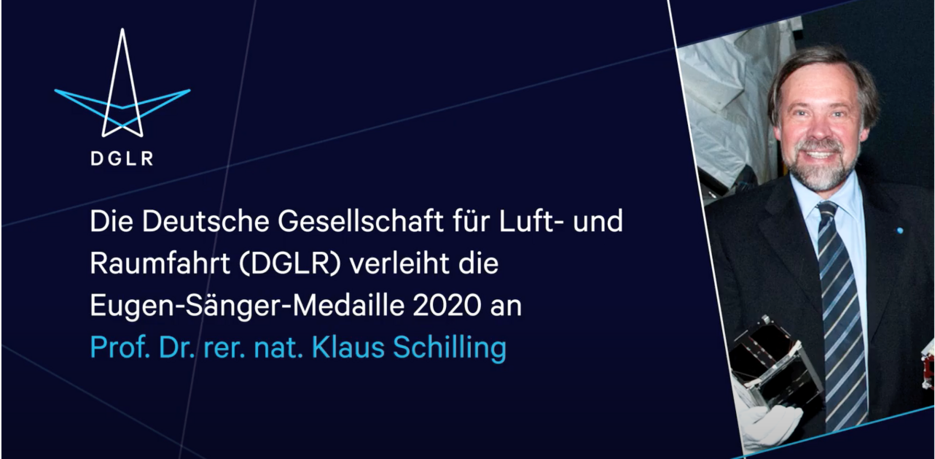Professor Schilling receives from DGLR the prestigious Eugen-Sänger-medal
08/24/2021The German aerospace society DGLR recognizes the contributions of Professor Schilling and his team to the field of small satellites with the prestigious Eugen-Sänger-medal.
Advances in miniaturization technology continuously decreased satellite mass and volume. Small satellites already account for the majority of satellites launched into orbit. The shorter construction periods accelerate technology innovations and enable new applications. "It is crucial that the disadvantages of miniaturization, such as increased sensitivity to harsh space radiation, are to be compensated by intelligent software," explains Schilling.
Thus, on the microcomputers on board, algorithms for rapid fault detection, identification and recovery ensure reliable operation. Building on his experience in the space industry at Airbus, Schilling developed the University Würzburg’s Experimental satellites, or UWE as shorthand, together with international students at University Würzburg. His team realized in 17 years numerous technology breakthroughs for small satellites and proved them in orbit.
Today, the UWE satellites are considered a pioneering achievement: in 2005, UWE-1 was the first German pico-satellite with a mass of less than one kilogram. As consulting professor at Stanford University 2002-2006 he had in the initial period of CubeSats very close cooperation Professor Bob Twiggs, who defined this standard.
While the Internet in Space was initially in focus of Schilling's research at University Würzburg, research emphasis for self-organizing multi-satellite formations followed and crucial technologies were realized step by step until 2020, when the NetSat mission was launched. He was founder of the private research institute “Zentrum für Telematik” ( www.telematik-zentrum.de/en ), as well as the company “S4- Smart Small Satellite Systems GmbH” ( www.s4-space.com ). Both take advantage of the elaborated technology knowhow and close the chain to advanced small satellite products for “New Space”, in particular small and efficient attitude control systems.
As single small satellites are already an economic reality, Schilling's research is focusing on distributed multi-satellite networks, performing complex joint observations such as computed tomography to characterize the interior of clouds for improved climate predictions.
"From the very beginning, Professor Schilling had recognised and promoted the importance of interdisciplinary technological cross-fertilization between computer science, automation, software development and robotics. His satellites impressively reflect this interaction of different components," said DGLR President Professor Rolf Henke.
Schilling is very pleased about the medal, which is considered the most important German award in the space sector: "This recognition is a great incentive for our team to continue intensive activities on sophisticated space technology. The medal recognizes contributions, that were only possible through the cooperation in interdisciplinary teams. My special thanks therefore go to the competent international teams that I had the privilege of coordinating."
The award is named after the rocket scientist Eugen Sänger (1905-1964). In the 55 years of its existence, it has only been awarded 26 times to international space pioneers. Previous recipients were the rocket pioneer Wernher von Braun (1973), the founder of Germany's largest space company OHB Manfred Fuchs (1991), and also the astronauts Ernst Messerschmidt and Thomas Reiter (2017).
Prof. Schilling's acceptance video
Media Coverage
in English:
[SatNews] [American Association for the Advancement of Science (AAAS)]
[European Research Council] [Alpha Galileo]
[Press Release University of Wuerzburg - English]
in German:
[DGLR] [YouTube] [BR24 - German] [MainPost] [Kurier]
[Press Release University of Wuerzburg - German]







